|
|
|
Sort Order |
|
|
|
Items / Page
|
|
|
|
|
|
|
| Srl | Item |
| 1 |
ID:
095236
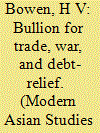

|
|
|
|
|
| Publication |
2010.
|
| Summary/Abstract |
This paper provides the first detailed assessment of British exports of silver to Asia during the initial phase of imperial expansion in India. It demonstrates that, contrary to the views of some historians, exports of silver were at times very considerable, notably after 1785, when they were used to fund war and debt-relief in India, as well as for trade. Focus is on the East India Company, but attention is paid to private exports, to British transfers of silver around Asia, and the paper ends with an analysis of 'reverse' flows to Britain established after 1810.
|
|
|
|
|
|
|
|
|
|
|
|
|
|
|
|
| 2 |
ID:
095238
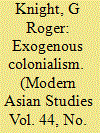

|
|
|
|
|
| Publication |
2010.
|
| Summary/Abstract |
This paper discusses the commercial history of the Java sugar industry in the interwar decades of the 1920s and 1930s. Java's late colonial industry had a uniquely exogenous character, in that, amongst the world's major producers of cane sugar in the late colonial era, it was singularly devoid of metropolitan or quasi-metropolitan markets. Instead, it sought its markets pre-eminently on the Asian 'mainland' to its north and northwest. The Indian subcontinent formed one such market, but East Asia formed the second, and it is the Java industry's fortunes in China and Japan that provide the focus of the present paper. This focus highlights the extent to which the partial collapse of the industry in the mid-1930s related to factors altogether more complex than a simple fall in consumption and drop in prices associated with the interwar Depression. Fundamentally, it was evolving economic autarchy throughout east Asia, encouraged by Depression conditions, which lay at the heart of the Java sugar industry's problems in this sector of its market. Key factors were Java's ambivalent relationship with an expanding but crisis-ridden Japanese sugar 'empire,' and the effect on its long-standing links with British sugar refineries in Hong Kong because of the latter's increasing difficulties in the China market. In tandem, they underscored the commercial hazards inherent in Java sugar's exogenous situation.
|
|
|
|
|
|
|
|
|
|
|
|
|
|
|
|
| 3 |
ID:
095249
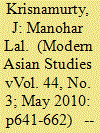

|
|
|
|
|
| Publication |
2010.
|
| Summary/Abstract |
Manohar Lal was an outstanding student of Alfred Marshall, a highly respected teacher, a successful lawyer-politician and a very able provincial Minister of Finance. The focus, in this paper, is on his stay in Cambridge until 1906, his career in India as an economist and as a lawyer and politician in the Punjab until 1945. I argue that his work in economics was not marked by great originality. His achievements were to have been a good teacher, to have successfully competed with British students and to have established close personal links with the British academic community. In politics, while he did not have a political base and was a scholar among politicians, he held high office with great competence. I believe he was one of the select groups of Indians who provided an inspiration to others by showing that Indians could compete successfully with the best from any country at the highest level.
|
|
|
|
|
|
|
|
|
|
|
|
|
|
|
|
| 4 |
ID:
095240


|
|
|
|
|
| Publication |
2010, 2010.
|
| Summary/Abstract |
In the winter of 1945, the multinational Chinese Maritime Customs Service opened an inquiry into the cooperation of hundreds of its own employees with Japanese occupation forces in China. This was, as far as the historical record allows us to say, the most thorough investigation undertaken in China into collaboration during World War Two. This paper represents the first historical analysis of the Customs 'Staff Investigation Committee.' It argues that the investigation represented a new direction for the Customs Service in China. The investigation's underpinning rationale was that Customs staff, Chinese and foreign, served the Kuomintang government before any other notion of Chinese or Service interests-a dramatic change in direction for an organisation that had been emblematic of treaty-port China. The investigation thus offers historians an insight into the understudied final years of the Customs Service, into the late Republican government's efforts to deal with the legacy of imperialism, and into the extent and rationale of collaboration in Nationalist China.
|
|
|
|
|
|
|
|
|
|
|
|
|
|
|
|
| 5 |
ID:
095248
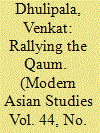

|
|
|
|
|
| Publication |
2010.
|
| Summary/Abstract |
This paper re-examines the nature of the Muslim League's mobilization of the UP Muslims during the period of Congress party rule and the extent to which it was successful in emerging as their 'authoritative, representative organization'. In the light of such a re-examination, the paper makes two arguments. First, in contrast to the existing historiography which highlights the role of Jinnah in the ML's revival, this paper underlines the agency of the local leadership of the ML in this process. Second, the paper argues that even though the ML emerged as a popular political party among the UP Muslims in this period, its strength still remained uncertain. This became evident during the Madhe Sahaba agitation between 1938 and 1939 that led to serious tensions and riots between Shias and Sunnis in the city of Lucknow. These tensions threatened to fracture the political base of the ML in the UP besides snowballing into a wider all-India conflict. During this crisis the ML stood aside helplessly, unable to exert its authority as the 'premier' organization of the Indian Muslims. These divisions within the Muslim community in the ML's putative bastion in the UP demonstrate that the party still had a task ahead in terms of rallying the Qaum.
|
|
|
|
|
|
|
|
|
|
|
|
|
|
|
|
| 6 |
ID:
095244
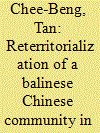

|
|
|
|
|
| Publication |
2010.
|
| Summary/Abstract |
This paper is about a special category of guiqiao or 'returned overseas Chinese', in southern Fujian. Arriving in China from Bali, Indonesia in 1961, the people were settled in an overseas Chinese farm. The paper illustrates how the re-migrants coped with life in China and how they see themselves today. The returned overseas Chinese reterritorize their Indonesian and Balinese cultural life in China, and they, including the local-born children, speak Balinese and eat Indonesian food. Their experiences provide much food for thought on acculturation, migration and identity as well as on the idea of 'homeland'
|
|
|
|
|
|
|
|
|
|
|
|
|
|
|
|
| 7 |
ID:
095246
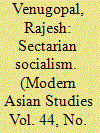

|
|
|
|
|
| Publication |
2010.
|
| Summary/Abstract |
This paper explores the politics of Sri Lanka's Janatha Vimukthi Peramuna (JVP) in the post-1994 period, when it re-created itself as a mainstream parliamentary political party and came to play a critical role in the collapse of the 2001-2004 peace process. The fundamental analytical enigma of the JVP lies in explaining its hybrid Marxist/Sinhala nationalist persona, which enabled it to craft a highly effective campaign of opposition to the Ranil Wickremasinghe government's two-track agenda of peace with market reforms. This paper examines how the JVP's Marxism relates to its Sinhala nationalism, and how it fits within the Sri Lanka's Marxist tradition as a whole. It argues that the JVP's increasing emphasis on Sinhala nationalism post-1999 has occurred in the context of de-radicalisation and parliamentary habilitation, and discusses the relevance of its ideological orientation to the material basis of Sinhala nationalism and its relationship with the social democratic state.
|
|
|
|
|
|
|
|
|
|
|
|
|
|
|
|
|
|
|
|
|